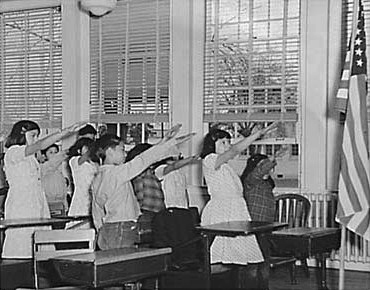“You’re Saying It Wrong”
Why the Pledge of Allegiance may have some soul-searching to do

Can students pledge their allegiance to America in French? Spanish? How about Arabic? A Fort Collins, Colorado, student thought so when, about a year ago, she recited an Arabic translation of the Pledge of Allegiance over her high school’s PA system. “I hope people will see it not as a negative way, not an offensive way,” she told The Coloradoan, “but as a way of accepting diversity and accepting the people of diverse backgrounds.” She was not so lucky.
Other controversies have arisen over the appropriateness of including “under God” in a secular pledge, of compulsory participation by both children and adults, and of the requirement that all who are able stand. (The courts have okayed “under God,” but schools technically cannot require students to speak or stand. Technically.)
Part of the problem, it seems to me, is that the Pledge of Allegiance serves two distinct purposes. The first is to offer a united show of support for all of those who have served the Republic. (Today this includes members of the military and their families; perhaps in balmier times this included members of Congress as well.) Like all songs—yes, the Pledge of Allegiance can be hummed!—the Pledge just doesn’t work if one person starts singing in French, or another person drops “under God.” Whatever power it has comes from everyone agreeing to follow this word with that word, from everyone being in it together.
But the Pledge is also what is known as a “performative utterance.” As philosopher of language J. L. Austin put it, “if a person makes an utterance of this sort we should say that he is doing something rather than merely saying something.” That is, to recite the Pledge of Allegiance is to actually pledge allegiance. This makes the Pledge feel an awful lot like a personal affirmation of citizenship. But like that other famous performative utterance—the wedding vow—shouldn’t students be able to choose or even personalize the commitments they make to their own countries?
The Pledge, as it was written in 1892, read as follows: “I pledge allegiance to my Flag and the Republic for which it stands, one nation, indivisible, with liberty and justice for all.” It picked up the “United States of America” clarification in 1923. Then, during World War II, a salute that had always accompanied the Pledge was axed—too Nazi-ish—in favor of keeping the right hand over the heart. “Under God” (which, as linguist Geoff Nunberg explains, “actually came about because of a linguistic misunderstanding”) wasn’t added by Congress until 1954. This is all to say that tweaking the Pledge to better suit today’s linguistic and cultural realities would not be without precedent.
Still, it is hard to imagine that any tweak could make the Pledge both things to all people. And even if it could, there is also the small matter of where it should be said. Practicing citizenship in a classroom setting may effectively conflate what makes a good student with what makes a good citizen. As University of South Carolina Professor Elaine Chun recently noted in an article based on her observations at a Texas public high school, it is no coincidence that the students whom she watched “structure their everyday lives around accumulating institutional forms of recognition—awards, honors, and positions” also tended to be the most “overtly patriotic”: aligning themselves with their country was a natural extension of their allegiance to school. But where does this then leave students whose attitudes toward school are a bit more complicated?


